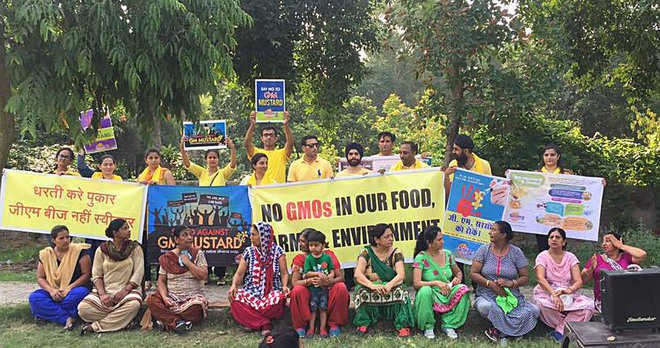
One such protest against the GM seeds. Tribune file
Vibha Sharma
Tribune News Service
New Delhi, November 7
Reacting to a new major development in the GM crop controversy after illegal GM soy cultivation was discovered in Gujarat, the Coalition for a GM-Free India said it required an urgent action against the regulators as well as seed suppliers.
Farmers ensnared into such illegal cultivation of unapproved seeds should not be criminalised, said the Coalition.
The Coalition in a statement issued on Tuesday said, “The regulatory system in the country is in tatters. Incident after incident shows that with the current regulatory regime, citizens’ interests cannot be protected. If the regulators had acted decisively in the past with severe deterrence against illegal Bt cotton and later HT cotton cultivation and other illegal imports of GM foods, this situation could have been prevented. The government has to think of a serious overhaul of the entire set-up and significant improvements in the inter-agency coordination are required to ensure that no illegal GM cultivation or sales takes place in the country.”
Bhartiya Kisan Sangh (BKS), a national farmers’ organisation, recently lodged a complaint with the Gujarat government and the central regulator Genetic Engineering Appraisal Committee (GEAC) about the illegal cultivation of GM soy in Aravalli district, in villages near Modasa town.
The Gujarat government is reported to have swung into action immediately to seize the stocks and get them tested, which subsequently were confirmed to be genetically modified, herbicide-tolerant soy. It is unclear, however, what the source of the seed is, and what is the extent of its illegal cultivation.
The presence of this GM soy cultivation not only threatens to become an irreversible threat to our environment and health, but also threatens the niche advantage that Indian non-GM soy was enjoying in the global markets, of fetching higher prices for Indian soy, given the large demand for non-GM soy in the world markets. This market is now threatened seriously.
This discovery of illegal GM soy cultivation comes at a time when India is about to host an Organic World Congress, the biggest congregation of the organic farming movement of the world, in Greater Noida on November 9, 10 and 11.
Ironically, India’s first GM crop cultivation–Bt cotton--was discovered in 2001 growing on thousands of hectares in Gujarat, spread surreptitiously and illegally by the biotech industry. Around the same time in 2001, the Genetic Engineering Approval Committee (GEAC) was caught off-guard when news about largescale illegal cultivation of Bt cotton emerged, even as field trials that were to decide whether India would go for such GM crops or not were still under way. GEAC had ordered the destruction of all illegally-produced GM material after confirming the presence of transgenic material, and asked for the purchase of such material from farmers, if needed, by the state government for destruction by burning. However, in March 2002, it ended up approving Bt cotton for commercial cultivation in India, and to this day, no liability was fixed for the illegal spread.
“It is a well-established strategy deployed worldwide of the biotech industry to first contaminate/spread seeds illegally, and then get regulatory approvals after such illegal cultivations. This has been seen time and again in other countries and in India too, both with Bt cotton and with herbicide-tolerant cotton which is now grown on lakhs of hectares, unapproved. The regulatory system is caught napping and unprepared time and again. They also have no commitment to their mandate and have not taken any action under the EPA, 1989, Rules or the liability clauses of EPA, 1986, (Sec 15) which prescribes imprisonment for a term which may extend to five years with fine which may extend to one lakh rupees, or with both. And in case the failure or contravention continues, with additional fine which may extend to five thousand rupees for every day during which such failure or contravention continues after the conviction for the first such contravention. We have never seen any liability fixed against contraventions of the 1989 bio-safety rules. It is time we fixed liability on the regulators too for the law to become effective,” said the Coalition.
(Follow The Tribune on Facebook; and Twitter @thetribunechd)
Further, there is prima facie contravention of Plant Quarantine (Regulation of Import into India) Order, 2003, which also regulates import and prohibition of import of plants and plant products into India.
The Coalition notes that illegal herbicide usage is an issue that marks illegal herbicide-tolerant GM crop cultivation, and asked for an immediate action on weed-killer sales on unauthorised crops like cotton, mustard and soybean. It pointed out that this also showcased the failure of pesticide regulators in the country, and called for a ban on the use of glyphosate, also given its many other known negative fallouts on health and environment.
GM HT soy cultivation in other countries is well documented to cause numerous problems–agri-chemical usage increase, soil health effects, impact on beneficial organisms like bees and monarch butterflies, health impacts from glyphosate used on the HT crop, increase in resistant ‘super weeds’, farmers caught in the trap of proprietary/patented treadmill technologies and decrease in yields. In India, the additional socio-economic issue of huge employment loss for poor agricultural household by the deployment of herbicide-tolerant seed technology is also an important matter of concern. Numerous official committees have repeatedly recommended against the introduction of such HT crops in the country, keeping all of this in mind.
“We urge the Government of India to enforce strictly the existing regulatory mechanisms and also tighten the regulation with regard to imports of GMOs and products thereof into the country. Several news reports indicated in the recent past that the GM foods entering our food chain in the country are illegal as per the FSSAI–however, they continue to be in the market with no action being taken. Consumers around the country are worried about the health implications from GM foods and it is time the government curbed illegal GM entry into India in all forms and modes urgently,” said the Coalition.
“We need Orders to be issued immediately that all state governments, after urgent ground-level verification, write back to the Centre on whether any illegal GM soy cultivation is suspected in their respective states. The GEAC itself should deploy investigation teams into the field to verify the existence of illegal GM cultivation anywhere in the country and take immediate stringent action against the same. There should be a ban on weed killer glyphosate to check its illegal use as well as the spread of illegal HT crop cultivation,” demanded the Coalition.
The campaign alliance threatened that it would launch a nationwide campaign if the regulatory body and the government did not swing into action.



























